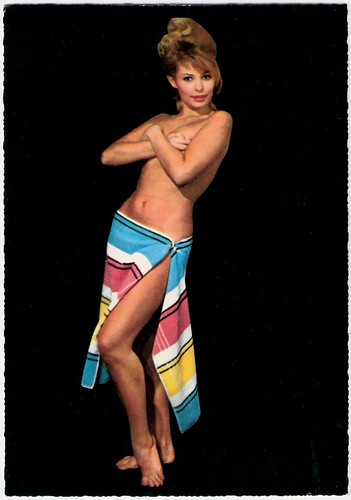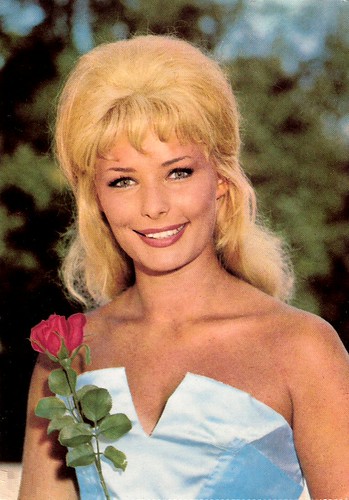On 22 April, Danish singer, actress and TV-icon Vivi Bach (1939) has passed away. Originally, she became known as ‘the first Danish teenager of Denmark' and 'the Danish Brigitte Bardot’. Although not a very talented actress she appeared in 48 films between 1958 and 1974. The German speaking public remembers her best for the legendary TV show Wünsch dir Was (1969 - 1972), which she co-hosted with husband Dietmar Schönherr and which attracted sometimes 30 million viewers. Vivi Bach was 73.
![Vivi Bach (1939 - 2013)]()
German postcard by Friedrich W. Sander Verlag, Minden/Westf. Sent by mail in 1965. Photo: Constantin / Roman Stempka. Publicity still for Wenn die Musik spielt am Wörthersee/When the music plays at the Wörthersee (1962, Hans Grimm).
The First Danish Teenager
Vivi Bach (or Vivienne Bach) was born Vivi Bak in Copenhagen, Denmark in 1939. She was the pretty daughter of a baker and as a child she was already interested in singing and dancing. She started out as a hairstylist but ended it to pursue a model career, with great success. She followed singing and acting classes, and went on tour as the singer of a band. She was briefly known as ‘the first Danish teenager’. Later she performed small stage roles in Copenhagen. She made her film debut in the comedy Krudt og klunker/Gunpowder and tassels (1958, Annelise Hovmand). Although she proved to be not the biggest talent as an actress, a handful Danish films followed, including Seksdagesløbet/Six Day Race (1958, Jørgen Roos), Pigen og vandpytten/The girl and the puddle (1958, Bent Christensen), and Pigen i søgelyset/The girl in the spotlight (1959, Bent Christensen, Anker Sørensen). These Danish films were moderately succesful in Scandinavia, but had little impact abroad.
![Vivi Bach]()
German postcard by Krüger, no. 902/276. Photo: Bernard of Hollywood.
![Vivi Bach]()
German postcard by Krüger, no. 902/309. Photo: Bernard of Hollywood.
![Vivi Bach]()
German postcard by Krüger, no. 900/277. Photo: Bernard of Hollywood.
Good Girl Roles
From 1959 on Vivi Bach also appeared in German films like Gitarren klingen leise durch die Nacht/Guitars Sound Quietly Through the Night (1959, Hans Deppe), Immer die Mädchen/Always the Girls (1959, Fritz Rémond), and Die Abenteuer des Grafen Bobby/The Adventures of Count Bobby (1961, Géza von Cziffra) with Peter Alexander. With her blonde hair and innocent looks, she was a natural for ‘good girl’ roles. She sang in many Schlagerfilms such as Schlagerparade (1960, Franz Marischka), Schlager-Raketen (1960, Erik Ode), and Schlagerparade 1961 (1961, Franz Marischka). She was also seen in international pictures, such as Death Drums Along the River (1963, Lawrence Huntington) with Richard Todd, and the Spaghettiwestern Le Pistole non discutono/Bullets Don't Argue (1964, Mario Caiano) with Rod Cameron as sherriff Pat Garrett and Horst Frank as his adversary Billy the Kid.
![Vivi Bach]()
German postcard by Krüger, no. 902/274. Photo: Bernard of Hollywood.
![Vivi Bach]()
German postcard by Krüger, no. 902/275. Photo: Bernard of Hollywood.
![Vivi Bach]()
German postcard by ISV, no. K 22, mailed in 1972. Photo: E. Schneider.
Schlager Career
Vivi Bach started her singing career in Germany with a duet with Schlager star Rex Gildo in 1960. She was contracted by Philips and recorded till 1964 eleven records with them. A big hit was her duet with Gerhard Wendland, Hey Vivi - Hey Gerhard (the German version of the US hit Hey Paula). She founded her own film company and produced Das Rätsel der roten Quaste/The Riddle of the Red Tassel (1963, Hubert Frank), which did not become a success. However, her leading man, Dietmar Schönherr, would become her husband in 1965. Vivi Bach married three times. Her first husband was the Austrian Heinz Sebeck and the second the Danish singer and actor Otto Brandenburg. With Schönherr she made films like Ein Ferienbett mit 100 PS/A Holiday Sleeper with 100 HP (1965, Wolfgang Becker), Blonde Fracht für Sansibar/Mozambique (1965, Robert Lynn), and the Golden Globe nominated Ski Fever (1966, Curt Siodmak). After her cinema career faded out in the late 1960’s, Bach kept herself busy as a television host. With the series Gala-Abend der Schallplatte she became a darling of the German speaking public. Bach and Schönherr were the co-hosts of the very popular Austrian-German-Swiss game show Wünsch Dir Was/Wish Yourself Something (1968 - 1972). In a 1971 show a candidate nearly drowned in a staged car accident. She worked not only as a host but as a TV producer too, like for the Personality Show Vivat Vivi (1973). In the 1970's she visited Denmark regularly to perform in films and record Danish records. In 1976 she made her last record, a duet with Dietmar Schönherr, the campy Molotow Cocktail Party, after which she retired. Since then Vivi Bach worked as a painter, illustrator and author of children’s books and lived with her husband on Ibiza. She was 73, when she died in her sleep in their Ibiza home.
Vivi Bach sings Darling Bye Bye, a German version of the Brenda Lee song Anybody but me. Source: Scaasifun (YouTube).
Rex Gildo & Vivi Bach sing In Ko-Ko-Kopenhagen in Am Sonntag will mein Süsser mit mir segeln gehn/On Sunday my sweet wants to go sailing with me (1961, Franz Marischka). Source: Fritz 51166 (YouTube).
Sources: Matt Blake (The Wild Eye), Sofie J. (Dans Mon Café), T-online (German), Wikipedia, and IMDb.

German postcard by Friedrich W. Sander Verlag, Minden/Westf. Sent by mail in 1965. Photo: Constantin / Roman Stempka. Publicity still for Wenn die Musik spielt am Wörthersee/When the music plays at the Wörthersee (1962, Hans Grimm).
The First Danish Teenager
Vivi Bach (or Vivienne Bach) was born Vivi Bak in Copenhagen, Denmark in 1939. She was the pretty daughter of a baker and as a child she was already interested in singing and dancing. She started out as a hairstylist but ended it to pursue a model career, with great success. She followed singing and acting classes, and went on tour as the singer of a band. She was briefly known as ‘the first Danish teenager’. Later she performed small stage roles in Copenhagen. She made her film debut in the comedy Krudt og klunker/Gunpowder and tassels (1958, Annelise Hovmand). Although she proved to be not the biggest talent as an actress, a handful Danish films followed, including Seksdagesløbet/Six Day Race (1958, Jørgen Roos), Pigen og vandpytten/The girl and the puddle (1958, Bent Christensen), and Pigen i søgelyset/The girl in the spotlight (1959, Bent Christensen, Anker Sørensen). These Danish films were moderately succesful in Scandinavia, but had little impact abroad.

German postcard by Krüger, no. 902/276. Photo: Bernard of Hollywood.

German postcard by Krüger, no. 902/309. Photo: Bernard of Hollywood.

German postcard by Krüger, no. 900/277. Photo: Bernard of Hollywood.
Good Girl Roles
From 1959 on Vivi Bach also appeared in German films like Gitarren klingen leise durch die Nacht/Guitars Sound Quietly Through the Night (1959, Hans Deppe), Immer die Mädchen/Always the Girls (1959, Fritz Rémond), and Die Abenteuer des Grafen Bobby/The Adventures of Count Bobby (1961, Géza von Cziffra) with Peter Alexander. With her blonde hair and innocent looks, she was a natural for ‘good girl’ roles. She sang in many Schlagerfilms such as Schlagerparade (1960, Franz Marischka), Schlager-Raketen (1960, Erik Ode), and Schlagerparade 1961 (1961, Franz Marischka). She was also seen in international pictures, such as Death Drums Along the River (1963, Lawrence Huntington) with Richard Todd, and the Spaghettiwestern Le Pistole non discutono/Bullets Don't Argue (1964, Mario Caiano) with Rod Cameron as sherriff Pat Garrett and Horst Frank as his adversary Billy the Kid.

German postcard by Krüger, no. 902/274. Photo: Bernard of Hollywood.

German postcard by Krüger, no. 902/275. Photo: Bernard of Hollywood.

German postcard by ISV, no. K 22, mailed in 1972. Photo: E. Schneider.
Schlager Career
Vivi Bach started her singing career in Germany with a duet with Schlager star Rex Gildo in 1960. She was contracted by Philips and recorded till 1964 eleven records with them. A big hit was her duet with Gerhard Wendland, Hey Vivi - Hey Gerhard (the German version of the US hit Hey Paula). She founded her own film company and produced Das Rätsel der roten Quaste/The Riddle of the Red Tassel (1963, Hubert Frank), which did not become a success. However, her leading man, Dietmar Schönherr, would become her husband in 1965. Vivi Bach married three times. Her first husband was the Austrian Heinz Sebeck and the second the Danish singer and actor Otto Brandenburg. With Schönherr she made films like Ein Ferienbett mit 100 PS/A Holiday Sleeper with 100 HP (1965, Wolfgang Becker), Blonde Fracht für Sansibar/Mozambique (1965, Robert Lynn), and the Golden Globe nominated Ski Fever (1966, Curt Siodmak). After her cinema career faded out in the late 1960’s, Bach kept herself busy as a television host. With the series Gala-Abend der Schallplatte she became a darling of the German speaking public. Bach and Schönherr were the co-hosts of the very popular Austrian-German-Swiss game show Wünsch Dir Was/Wish Yourself Something (1968 - 1972). In a 1971 show a candidate nearly drowned in a staged car accident. She worked not only as a host but as a TV producer too, like for the Personality Show Vivat Vivi (1973). In the 1970's she visited Denmark regularly to perform in films and record Danish records. In 1976 she made her last record, a duet with Dietmar Schönherr, the campy Molotow Cocktail Party, after which she retired. Since then Vivi Bach worked as a painter, illustrator and author of children’s books and lived with her husband on Ibiza. She was 73, when she died in her sleep in their Ibiza home.
Vivi Bach sings Darling Bye Bye, a German version of the Brenda Lee song Anybody but me. Source: Scaasifun (YouTube).
Rex Gildo & Vivi Bach sing In Ko-Ko-Kopenhagen in Am Sonntag will mein Süsser mit mir segeln gehn/On Sunday my sweet wants to go sailing with me (1961, Franz Marischka). Source: Fritz 51166 (YouTube).
Sources: Matt Blake (The Wild Eye), Sofie J. (Dans Mon Café), T-online (German), Wikipedia, and IMDb.